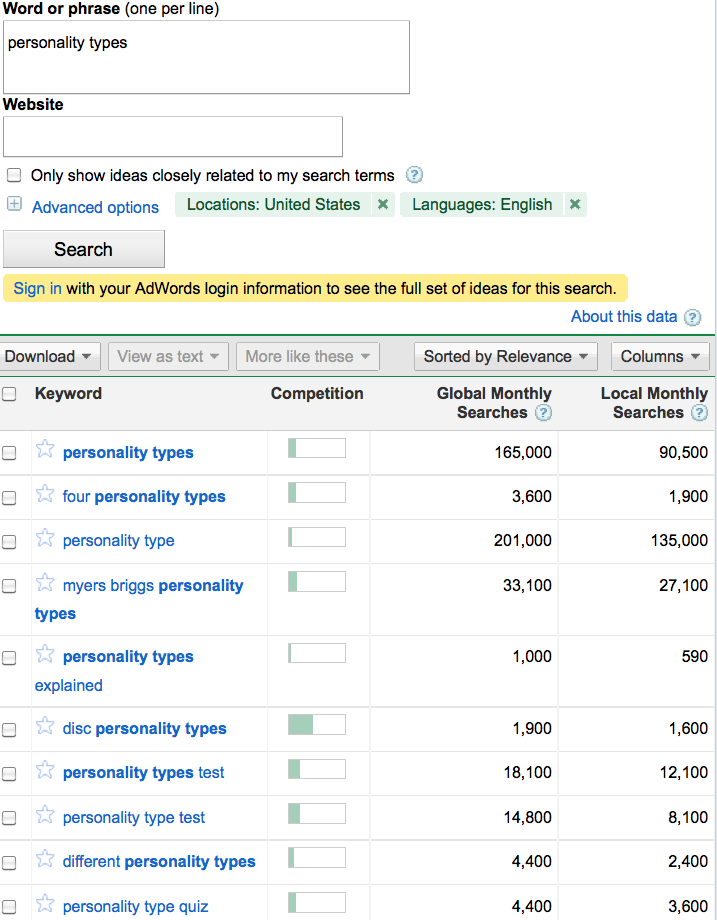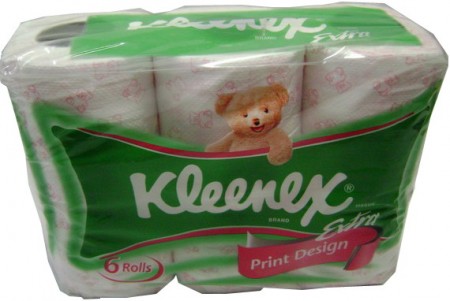57 Meditations on Kicking @$$ in Business and Life"4.8/5 stars" on Amazon
A Long List Of Words In Our Brains That Brands Own
Tweet CommentThe average American knows about 12,000 words (though Shakespeare was said to have had known 66,000) — the best brands are ones that own the most market share of a couple of those words.
CNN owns “news” in my brain. When I think of “reggae,” it’s Bob Marley — he owns it. There’s an awesome analysis of this in Positioning: The Battle For Your Mind (they discuss the concept of ladders (product categories) in your brain with room for just a handful of rungs (brands) — it’s the primary reason I voted it one of the Top 20 Best Business Books Of All Time!).
Who cares? Well, if your business wants market share of something, you have to decide which words you are going to try to “own” in my brain. …
No comments yet | Continue Reading »
Sunday, October 2nd, 2011
The 50 Best Product Taglines By Industry
Tweet 3 CommentsAfter naming a product, the tagline may be the most important marketing lever you can pull.
Afterall, the name of the product opens up the conversation with your customer…but the tagline can immediately tell them what it is that you do — and what makes you unique.
You’ve probably seen how much I love lists.
So I’ve compiled a list of 50+ of my favorite taglines. Enjoy!
Automobile
- Avis — “We’re #2, so we try harder”
- BMW — “The ultimate driving machine”
- Volkswagon — “Think small”
- Zipcar — “Wheels when you want them”
3 comments so far (is that a lot?) | Continue Reading »
Monday, September 26th, 2011
5 Basic Rules To Consider Before Naming Your Product
Tweet CommentI re-read the must-read marketing book Positioning: The Battle For Your Mind (#13 on my 20 Best Business Books Of All Time list) over the summer.
It inspired this simple list of naming tips (which I think is a good foll0w-up to 5 Tips On How To Name Your Brand To Be As Dominant As Kleenex).
How To Name A Product: 5 Basic Rules To Consider
1) Include Your Prospect’s Major Benefit (Or Pain & Urgency)
Close-Up Toothpaste shows a clear benefit about making your teeth look better.
Shake ‘n Bake (for cooking chicken) tells you the two simple steps — you shake (the herbs) and you bake (the chicken) — to make tasty chicken.
You may also consider the pain or urgency that your customer has.
For example, if you have dandruff and you want to address the flakes on your shoulders as well as shampoo your hair, Head & Shoulders shampoo is a darn good name.
2) Be Almost, But Not Quite, Generic
Microsoft names its product because it focused on “micro”-computer “soft”ware.
Kentucky Fried Chicken is self-explanatory. People Magazine is pretty good too.
But don’t go too generic, warns the book Positioning: “Lite” beer from Miller was the industry leader but it lost its brand positioning when other beers co-opted the name (Bud Light, Coors Light, etc.).
The law sided with those competitors since “Lite” is generic and so similar to “Light” (as in opposite of heavy).
No comments yet | Continue Reading »
Thursday, March 3rd, 2011
6 Easy Tools To Help You Name Stuff On The Web
Tweet 7 CommentsBelow are six good ones I’ve used.
Naming Ideas: Where To Start?
I think Google’s Keyword Tool is a great place to start as it provides you with the # of monthly searches being made for certain words/phrases.
Let’s pretend that I’m interested in naming a business that deals in “personality types” — type that into the search box.

7 comments so far (is that a lot?) | Continue Reading »
Saturday, February 12th, 2011
The Best Examples of Alliteration in Business, Brands & Other Stuff
Tweet 28 CommentsI was intrigued when I noticed that at least 10 of the The Top 100 Synonymous Genericized Brands I posted included alliteration: brands like PowerPoint, RotoRooter, Google and Armor All.
What is alliteration?

The Most Alliterative Man On Earth? (Jesse Jackson is alliterative in speeches, has alliteration in his name and likes to attend Million Man Marches)
The definition of alliteration is repeating the same sound in two or more words in close succession, such as:
“She sells sea shells by the sea shore.”
Alliteration is widely accepted in the research/scientific community as a tool to enhance memory.^
While alliteration in such toungue-twisters (there are also many in poems and songs) is fun — I’ve been thinking about alliteration in business and brands lately.
So, I’ve compiled a list of examples of alliteration used for commercial purposes (e.g. company names, products, real-life and fictional personalities and even fruit, sayings and other stuff).
Retailers
- American Apparel
- Bed, Bath & Beyond
28 comments so far (is that a lot?) | Continue Reading »
Wednesday, February 9th, 2011
5 Tips On How To Name Your Brand To Be As Dominant As Kleenex
Tweet CommentHow do you create a “Kleenex”-like brand that is synonymous with its product category?
After I crafted The Top 100 Colloquial Brands, I came up with some observations about these brands that might be good tips for you to use to name your brands.
Enjoy!

5 Tips On How To Create A Colloquial/Genericized Brand
1) Use Alliteration
Top brands use alliteration, which is typically defined as using the same sounding first syllable sequentially. Examples of alliteration in the …
No comments yet | Continue Reading »
Sunday, January 23rd, 2011
The Top 100 Brand Names Used as Generic Terms
Tweet 22 CommentsHow many brands can you count in the following sentence:
“I needed some aspirin, a band-aid, ace bandage — and probably a jacuzzi!– after my zipper got caught in an escalator while my realtor friend and I carried a bubble-wrapped ping-pong table from a dumpster to our jeep and slipped on our California stir fry with broccolini take-out.”
If you counted thirteen then you are correct!
They are brands whose names are used in day to day conversations as generic terms synonymous with their product categories (e.g. more people refer to a “frisbee” (a brand) than a “flying disc.” (the category)).
Note: These brands are called by many different terms: “Colloquialized,” “Synonymous,” to “Genericized” to “Generic Trademarks”.
I made a list of the top 100 of these colloquial brands using one simple criterion: would I use the brand name instead of the product category if I was referring to the product/activity in a sentence (e.g. “I need a band-aid” versus “I need an adhesive bandage.”).
Enjoy!
The Top 100 “Genericized” Brands (Synonomous With Their Product Categories)
- Band-Aid — An adhesive bandage brand owned by Johnson & Johnson.
- Zipper — This device that brings together two pieces of fabric was originally a trademark of B.F. Goodrich but is now generic.^
- Jell-O — A brand name of gelatin desserts owned by Kraft Foods.
- Yo-Yo — Generic (originally a trademark of Duncan Yo-Yo Company.^
- Frisbee — A flying disc product trademarked by Wham-O.
